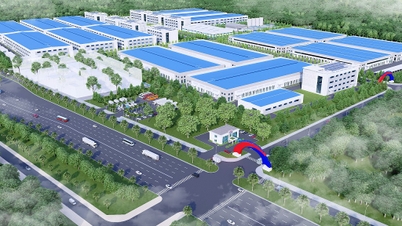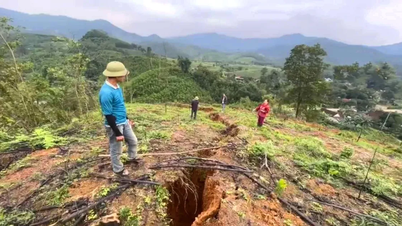For a long time, the State has not only been a “referee” but also a “big player” in markets such as banking, energy, telecommunications, and land. When it plays the role of a “player”, resources will naturally be concentrated on that player, creating distortions for other players right on the “playing field”, don’t you think?
Dr. Tran Dinh Thien : Here, the core question is not only whether the State should participate in the market or not, but: Is the State discriminating between its sector and the private sector or not?
That is the institutional issue that needs to be carefully examined in the coming period. Because if the State continues to play the role of “both referee and player”, then no matter what, the principle of market equality cannot be implemented, and all reforms will only stop at form.
We have come from a centrally planned economy , where the State is almost the only entity, playing the entire role of regulation, production and distribution. When moving to a market economy, the role of the State in the economy should have been gradually narrowed, shifting from “doer” to “creator”, from “production subject” to “coordination and supervision subject”.
However, for a long time, we have maintained the view that the State economy is the "main" and "most important", while the private sector - although accounting for the majority of enterprises and jobs - is still considered a "supplementary component".
Only today has Vietnam officially identified the private economy as the most important driving force of the economy.

Mr. Tran Dinh Thien: People and businesses believe because they see real change happening – from resolutions to laws and actions.
In a market economy, the State should understand that the private sector is the “main player”, while the State plays a “facilitating” role: creating conditions, supporting and supervising. Although the private sector is still weak, policies must aim to foster and protect them, and cannot allow the situation of “reverse role assignment”: the State holds the majority of resources, while the private sector only plays a supporting role.
This approach is a form of discrimination, contrary to the principles of a market economy. The basic principle must be: economic components are equal in legal status, access to resources and opportunities.
In other words: if the State is holding many power plants, while the private sector is not yet capable of participating, then the State must temporarily take on that role. But at the same time, it must pave the way for the private sector to participate; it cannot monopolize forever just because it is holding the benefits.
The issue is not State or private, but the allocation of resources on the principle of non-discrimination, openness and transparency.
In fact, many current laws still contain traces of discrimination. For example, the concept of “the State economy is the mainstay” is correct, because this economic sector includes the majority of national resources – from the budget, resources, land, and state-owned enterprises, etc.
That is correct in principle, but it needs to be clearly understood: Regarding land, the State is only the representative owner; regarding the budget, it is the property of the entire people, not the private property of the State. Therefore, all entities – whether state-owned or private enterprises – must have equal access.
Therefore, the mechanism for allocating national resources – especially land and budget – must comply with the principles of non-discrimination, openness, transparency, and based on genuine competition.
As for state-owned enterprises, the part that is truly publicly owned must be managed transparently, professionally, and publicly. If the State keeps “holding on” to business sectors, from energy to banking, without a market supervision mechanism, efficiency will never be high. In sectors where resources are allocated fairly, there is market competition, and no discrimination, we always see outstanding efficiency. The competitive and public market for goods is an example. We always see that goods are never in short supply, prices are always competitive, and no intervention is required.

Remove all barriers in perception and institutions and we will develop spectacularly. Photo: Hoang Ha
In many documents of many congresses, “innovative thinking” and the requirement to “allocate resources according to market principles” are always mentioned again and again. How do you perceive that reality?
This is a difficult point because we still do not have a system that truly encourages the private economy. In the subconscious, many people still have the mentality that the “private economy” is exploitative. It is this obsession that causes the private sector – although acknowledged – to be excluded from the game at the deep level of policy.
That's why I said that considering the private economy as the most important driving force this time is essentially a liberation of thought - a "real liberation", not just a talk.
Because when the perception has changed, the designed policies will no longer be haunted by the idea that “private” is exploitative. On the contrary, it is the private economic sector that serves the most socialist spirit. Why? Because it is the private economic sector that creates 82% of jobs and helps improve the lives of the majority of workers. Twenty or thirty years ago, I used to tell many senior leaders: “It is the private sector that has the highest socialism.”
Because they create jobs, generate income, contribute to poverty reduction and improve social welfare. If the State creates conditions for the private sector to develop strongly, they can do even more good things for the people - and that is the essence of modern socialism.
Therefore, the issue today is not only policy innovation, but more deeply, it is ideological liberation – escaping the obsession that the “private economy” is exploitative.
We are going through a process of “liberation” and “renewal” of perception and thinking. But it is true that the most difficult step lies at the fundamental level of thinking, when throughout history, our society has been haunted by the idea that “the rich are exploiters”, that getting rich is contrary to the spirit of “fairness”.
Fortunately, the private sector has been recognized as the main engine of development. By doing so, removing all barriers in perception and institutions, I believe we will develop spectacularly.
The problem is, a series of resolutions with a reform spirit were issued very quickly with great commitment and determination. Along with that were resolutions of the National Assembly and the Government,…
We say "innovation of thinking", "market-based resource allocation", or "institutional breakthrough" are more convincing, because they are clear, mature results of practice.
For example, the assertion that "the private economy is the most important driving force" and that science and technology must lead development must become the driving force for development, not just a slogan. Or the commitment that "Institutional breakthroughs must be breakthroughs of breakthroughs" has received widespread consensus.
Today, innovation in thinking is much stronger. People and businesses believe because they see real change happening – from resolutions to laws and actions.
This time, we choose the breakthrough of all breakthroughs: the institution. But even “institutional breakthrough” must have specific coordinates, not general terms.
For example, a breakthrough in the Land Law has not been achieved for many years because it affects interests. If we want the land market to operate, we must break the dominant interest structure, just like we broke the monopoly in the commercial sector before.
The biggest benefit in land always lies in the connection between the government apparatus and speculators. Therefore, the key to land reform is a transparent pricing system.
At present, we have not yet clearly defined what land prices are – what market prices are, what the pricing mechanism is, and how to ensure fairness for development. While the market cannot bring absolute fairness, it can create fair competition, leading to a more reasonable and balanced allocation of resources.
If that can be done, the new Land Law will truly hit the right choke point to free up resources and open up the market.
Vietnamnet.vn
Source: https://vietnamnet.vn/chung-ta-se-phat-trien-ngoan-muc-2462577.html


![[Photo] General Secretary To Lam receives Vice President of Luxshare-ICT Group (China)](https://vphoto.vietnam.vn/thumb/1200x675/vietnam/resource/IMAGE/2025/11/15/1763211137119_a1-bnd-7809-8939-jpg.webp)


![[Photo] Panorama of the 2025 Community Action Awards Final Round](https://vphoto.vietnam.vn/thumb/1200x675/vietnam/resource/IMAGE/2025/11/15/1763206932975_chi-7868-jpg.webp)
![[Photo] Prime Minister Pham Minh Chinh meets with representatives of outstanding teachers](https://vphoto.vietnam.vn/thumb/1200x675/vietnam/resource/IMAGE/2025/11/15/1763215934276_dsc-0578-jpg.webp)

























































































Comment (0)